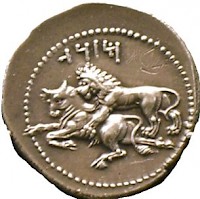Mazaeus
Mazaeus (c.385-328): Persian nobleman, played an important role during the conquest of the Achaemenid empire by the Macedonian king Alexander the Great.

Mazaeus first known office is that of satrap of Cilicia, where he may have been appointed as early as 361; coins prove that later, the region known as Abar naharâ ("Across the river" - modern Syria, Lebanon and Israel) was added to Mazaeus' territories. As satrap, he fought against the Phoenicians of Sidon, who had revolted and were supported by the pharaoh of Egypt, Nectanebo II, and 4,000 mercenaries commanded by the Greek commander Mentor of Rhodes. The coins with the Aramaic legend Mazdaï all belong to these years.
Under king Darius III Codomannus (r.336-330), Mazaeus appears to have been promoted: he gave up Cilicia and may have received in return Birît nârim ("Between the rivers"). The Greeks called this country Mesopotamia; together with Syria, it was sometimes called Athurâ or Assyria. Mazaeus must have been one of the most important officials in the Achaemenid empire. He was promised in marriage to the king's daughter Barsine, who is also called Statira.
In 334, Alexander the Great invaded the Achaemenid empire; he defeated a large Persian army in the battle of Issus (333) and conquered Syria, Lebanon, Israel and Egypt during the next year. Meanwhile, the Persians were building a new army. Because Mazaeus is not mentioned by the Alexander historians, it has been argued that Mazaeus was, at this moment, also satrap of Babylonia and had to guard Darius' back.
In August 331, Mazaeus commanded a small cavalry army near Thapsacus, a ford in the Euphrates. Although Alexander could cross the river without any losses, Mazaeus was able to obstruct his way to Babylon and made the invader take the road through the north of Mesopotamia; this forced Alexander to go to Assyria, where king Darius was ready with a large army.
The decisive battle took place at Gaugamela on 1 October 331, and although Mazaeus fought bravely on the Persian right wing, his king's flight made the Persian army collapse. After this defeat, the enemies of Persia could invade Babylonia. When Alexander reached Sippar, he announced that Babylon would not be plundered, after which Mazaeus surrendered the great city. (Go here for a Babylonian eyewitness account, and here for a Latin story.) Alexander entered the splendid capital of the ancient Near East in October.
Mazaeus entertained the new king in Babylon and gave him advise. In return, Alexander appointed him as satrap of Babylonia; he was the first Persian in Alexander's empire to receive such an important office. Mazaeus must have done his job well, because in the next years there were many similar appointments. He must have played a very important role, convincing his compatriots that after Gaugamela, it was better to join than to fight the invaders.
He died in 328 and left at least two sons: Ardu-Bêl and Vidarna took part in Alexander's campaigns in the east. The oldest (who is called Artiboles, Antibelus or Brochubelus in Greek sources) announced to Alexander that Darius III had been arrested; he and his brother, also known as Hydarnes, were appointed in an elite cavalry unit in 324.